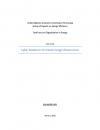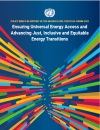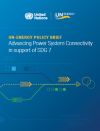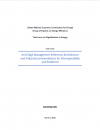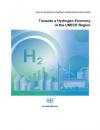Publications
Displaying Results 1 - 5 of 5
- English
Digitalization is gaining more and more attention as a way to support and complement the energy transition process. Digitalization entails the use of digital technologies for existing processes, as it helps address existing challenges in new ways.
While using an integrated energy system with intelligent connected devices has many advantages, it also causes challenges. One of these challenges is
- English
The sixth compilation of the SDG 7 Policy Briefs, titled "Ensuring Universal Energy Access and Advancing Just, Inclusive and Equitable Energy Transitions," prepared by the SDG 7 Technical Advisory Group (SDG7 TAG), in support of the review of the SDGs at the United Nations High-Level Political Forum 2023.
- English
This UN-Energy Policy Brief was prepared in support of the SDG7 review at the High-level Political Forum 2023 in line with the UN-Energy Plan of Action Towards 2025. The Plan outlines UN-Energy’s contributions towards the implementation of the Global Action Plan for Accelerated SDG 7 Action presented by the UN Secretary-General as an outcome of the UN High-level Dialogue on Energy in 2021. The
- English
This case study addresses the challenge of distributed energy resources integration to support grid resilience, identifying key infrastructure requirements, assessing policy developments and deriving recommendations. The underlying premise of this case study asserts that whilst the energy sector is making advances towards decarbonization, decentralization and digitalization, the increasing share
- English
Hydrogen is an energy carrier that can decarbonize economies and promote sustainable economic growth and system resilience. Although many low-emission hydrogen projects have been announced over the past two years, a mere 4% of them have reached a final investment decision. This indicates that achieving the scale and pace of hydrogen deployment requires more decisive actions from policymakers and


